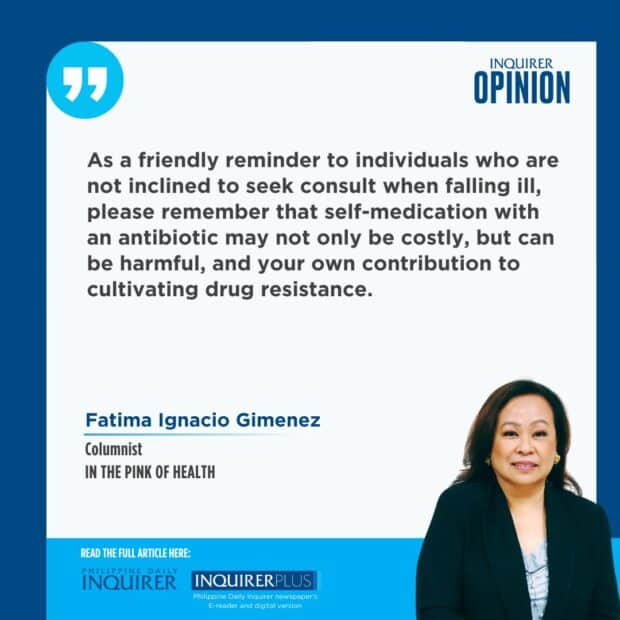Treading on antibiotics

My nasal discharge has become so thick and has changed color, shouldn’t I be taking antibiotics?”
If you are a doctor, you may have probably been asked this particular question multiple times. As the patient, you may have also received this reply, that in cases of upper respiratory tract infections such as the common cold which is mostly caused by viruses and self-limiting, it provides no benefit.
As a friendly reminder to individuals who are not inclined to seek consult when falling ill, please remember that self-medication with an antibiotic may not only be costly, but can be harmful, and your own contribution to cultivating drug resistance. For physicians, we know that while these may be an integral part of management, the decision to prescribe would always need a proper assessment of the patient’s condition. Given the license and the privilege to do so, we should also be judicious in its use.
Witnessing firsthand how microbes have managed to outmaneuver us, even with last-line antibiotics, we are very much aware of how this can deeply limit our human ability to overcome overwhelming and complicated infections. The World Health Organization (WHO) in June of this year released a report that reflected the worrisome state of antibacterial development amidst growing resistance amongst the deadliest pathogens. The WHO’s assistant director general for antimicrobial resistance ad interim, Dr. Yukiko Nakatani, echoed what my colleagues and I have been experiencing, that even with the introduction of newer drugs, there is a problem of access. In her words, “Antibacterial agents are simply not reaching the patients who desperately need them, in countries of all income levels.
”As clinicians, this is our daily reality. We have seen how families have dug deep into their pockets to the point of near-bankruptcy, to provide medications that would tip the balance toward a greater chance of a loved one’s cure and survival. In government and government-controlled hospitals, access may also be a concern if the particular drug is not included in the hospital or national formulary. In certain situations, there is that recurring problem of supply even if there is a no-balance billing policy, as these hospitals are always full and understandingly operating beyond capacity. At this point, I have to step on the brakes, for this warrants another round of discussions.
So how can we help? While we can’t change the world, we can do our share, even if you think it is minuscule. Unless you are in a plastic bubble, all of us will eventually come to a point wherein use will be warranted, and we have to ask ourselves what we know about the subject and how we look at antibacterials. A little or even an overload of information has its downside so allow me to fill some gaps that can hopefully give a clearer picture on why it is imperative to practice caution.
First, we have to understand why we need to seek consult for the following reasons. A doctor will always be in a better position than Google in diagnosing and treating your illness. You may have at one point in your life made to undergo diagnostics to complement your physician’s impression. These are the elements that influence subsequent management and the decision to utilize antibiotics requires weighing the benefits versus possible risks. There are side effects that can be minor or life-threatening and can include, but are not limited to, hypersensitivity or, in the worst-case scenario, anaphylactic reactions, gastrointestinal disturbances like diarrhea, which if substantial can lead to dehydration, or cause disturbances in neurologic, auditory, cardiac, kidney, or hepatic function.
As a patient, it would be prudent to be as accurate as possible when relaying your condition to include adverse effects from past intake and your current medications as there have been instances of drug interaction. For children who are not miniature adults, these are computed according to their weight to prevent overdosage.
Timing and duration are important as both influence absorption and cure. This is why you are instructed when and how long you must take the medication. Easier said than done as the “struggle is real.” Anyone can identify with the difficulty of adhering to a prescription especially if, as one child told me, “It tastes and smells bad and are too big to swallow in one go.” Adults are not exempt, my late father and uncle needed to mentally prepare themselves and would embed their pills in a banana or a fruit just to adhere to what the doctor ordered. For those who have taken the route of prescription-sharing, self-medicated with an antibiotic that worked with them before for a similar condition, or stopped intake because they felt better after a few days, please do yourself and the world a favor. Remember that antimicrobial resistance is perpetuated by misuse and overuse. Never be a part of this practice.
timgim_67@yahoo.com




















